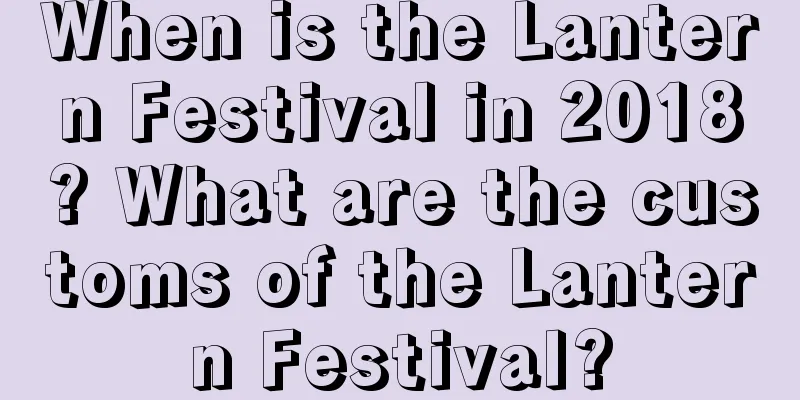When is the Lantern Festival in 2018? What are the customs of the Lantern Festival?

Introduction: China has been a traditional country since ancient times, and therefore has many traditional festivals and customs, and the Lantern Festival is one of them. So when is the Lantern Festival in 2018? What are the customs of the Lantern Festival? The Fortune Teller website provides you with more information related to the first month of the lunar calendar in 2018. You are welcome to learn more about it!When is the Lantern Festival in 2018?The Lantern Festival in 2018 is on March 2, 2018, the fifteenth day of the first lunar month, which is Friday.The Lantern Festival, also known as the Shangyuan Festival, the Little New Year, the Yuanxiao Festival or the Lantern Festival, is the first important festival after the Spring Festival. It is one of the traditional festivals of China, the regions in the Chinese character cultural circle and overseas Chinese. The first month of the lunar calendar is the first month of the year. The ancients called the night "xiao", so the fifteenth day of the first full moon night of the year is called the Lantern Festival. What are the customs of the Lantern Festival?Eating Yuanxiao <br /> Eating Yuanxiao on the 15th day of the first lunar month is a traditional food in China. In the Song Dynasty, a novel food for the Lantern Festival became popular among the people. This kind of food was first called "Fuyuanzi" and later called "Yuanxiao". Businessmen also called it "yuanbao". Eating Yuanxiao represents a more prosperous life, a happy and harmonious life.Dragon Dance <br /> Dragon dance is a traditional dance originated in China. Dragon and lion dances were part of the annual major festivals in ancient times. The dragon is an ancient totem of China. The dragon lantern show on the fifteenth day of the first lunar month has spread all over the country and even to places where Chinese people live around the world! Lion Dance <br /> Lion dance is an excellent folk art in China. During the Lantern Festival or gatherings and celebrations, people perform lion dance to liven up the atmosphere. Chinese folk tradition believes that lion dancing can drive away evil spirits. Therefore, during festive occasions, such as new opening celebrations, spring festivals, etc., people like to play gongs and drums and perform lion dances to add to the celebration. Guess lantern riddles "Guessing lantern riddles" is also called "playing lantern riddles". It is a unique form of entertainment in China with rich national style. It is a special activity of the Lantern Festival that has been passed down since ancient times. On the fifteenth day of the first lunar month, every household hangs up colorful lanterns and sets off fireworks. Later, some people wrote riddles on pieces of paper and posted them on the colorful lanterns for people to guess. Because riddles can enlighten the wisdom and cater to the festive atmosphere, many people responded to them, and guessing riddles gradually became an indispensable program of the Lantern Festival. Sending Lanterns <br /> Sending lanterns is also called sending lanterns. It is a traditional folk custom of the Han nationality. Before the Lantern Festival, the bride's family sends lanterns to the newly married daughter's family, or relatives and friends send lanterns to the newly married infertile family in order to wish for a good omen of having children. Stilt-walking <br /> Stilt-walking is also called "Cai Gaoqiao", a kind of folk acrobatics. Performers dress up as characters from dramas or legends and perform as they walk on wooden sticks with footrests. Stilt-walking clubs are usually organized by the masses spontaneously. The street parade begins on the 11th and 12th day of the first lunar month, implying that people should register for one of the many folk flower festivals this year. The street festival officially starts on the 15th day of the first lunar month and ends on the 18th. Sacrifice to the door and the house <br /> In ancient times, there were "seven sacrifices", these are two of them. The method of sacrifice is to insert a willow branch above the door, insert a pair of chopsticks into a bowl of bean porridge, or directly place wine and meat in front of the door. Welcoming Zigu <br /> Welcoming Zigu is a traditional folk activity of the Han nationality. Zi Gu is also called Qi (Qi) Gu, and in the north it is often called Toilet Gu or Keng San Gu. According to the ancient Han folk custom, on the fifteenth day of the first lunar month, people would welcome the toilet goddess Zi Gu and offer sacrifices to her, divine about silkworms and other matters. Legend has it that Zi Gu was originally a concubine of a family. She was envied by the eldest wife and was killed in the toilet on the fifteenth day of the first lunar month. She became the toilet god. Therefore, the Han people often make a woman in the shape of Zi Gu and worship her in the pigpen in the toilet at night. This custom is popular in all parts of the north and south, and was recorded as early as the Southern and Northern Dynasties. Walking Away from All Diseases <br /> Walking away from all diseases is a traditional folk culture of the Han nationality in northern China since the Ming and Qing Dynasties. Some people do it on the 15th day, but most of them do it on the 16th day. On this day, women dressed in festive attire, went out of their homes in groups, walked across dangerous bridges, climbed up city walls, and touched nails to pray for children, and did not return until midnight. On this day, men, women, old and young in rural Ju County go for a walk in the wild. It is called "walking to keep old". It is said that walking once a year can keep one young and ageless. Chasing rats <br /> Chasing rats is a Lantern Festival activity that began in the Wei and Jin Dynasties. This is mainly said to people who raise silkworms. Because mice often eat large numbers of silkworms at night, people say that if you feed mice with rice porridge on the fifteenth day of the first lunar month, they will stop eating silkworms. Summary: The above content is about [When is the Lantern Festival in 2018? What are the customs of the Lantern Festival? 】Problem analysis, hope it can help everyone! |
Recommend
Is the day before Qingming Festival in 2020 the Cold Food Festival? Check the do’s and don’ts on April 3!
Introduction: Qingming Festival is an important tr...
Is the third day of the sixth lunar month in 2019 a suitable day for setting up the bed? How to choose an auspicious time for setting up the bed?
Introduction: Setting up the bed is also a major e...
Are girls born on June 11, 2018 in the lunar calendar born to be rich?
Introduction: No one can choose the time of birth,...
Is the hexagram of Shangsi Festival in 2019 a good one? Where is the God of Wealth on this day?
Is the hexagram of Shangsi Festival in 2019 a good...
When is the Double Ninth Festival in 2018? What is the Double Ninth Festival like?
When the Double Ninth Festival arrives, chrysanthe...
Is it good to be born on the eighth day of the seventh lunar month in 2018?
Different birth dates may lead to different lives....
Is it a good idea to offer sacrifices on the 25th day of the second lunar month in 2018? Is the day auspicious?
Sacrifice is one of China's traditional cultur...
What is the fate and numerology of a boy born the day before Qingming Festival (Cold Food Festival)?
Cold Food Festival is one of China's tradition...
Is the Great Cold season suitable for health preservation?
The cold season of Great Cold is very suitable for...
What can’t we do during the Qingming Festival? Is it okay to visit the graves and pay respects to our ancestors during the Qingming Festival in 2019?
Introduction: Qingming Festival is a traditional a...
Is October 23rd, 2022 suitable for burning incense and worshiping Buddha? Is it an auspicious day for praying?
Is October 23rd, 2022 suitable for burning incense...
What are the Feng Shui taboos for praying for peace during the Winter Solstice? Can we pray for blessings during the Winter Solstice in 2021?
The Winter Solstice is not only one of the 24 sola...
Is it a good day to get married on the second day of the twelfth lunar month in 2017?
The twelfth month of the lunar calendar is also k...
Is October 28th of the lunar calendar in the year of the Tiger in 2022 an auspicious day for engagement?
Is October 28th of the lunar calendar in the year ...
Is the sixth day of the ninth lunar month in 2018 a good day? Is it possible to hold sacrifices?
Introduction: Sacrifice is one of the traditional ...









